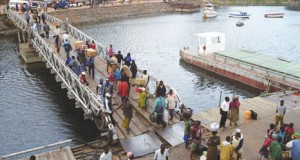As human trafficking reach alarming rates across Africa, the relatively small Muslim community in Malawi have come together to combat the rising phenomenon of human and child trafficking in the highly impoverished Southern African nation.
“Until recently, Malawi has never had any piece of legislation on human trafficking. The absence of the law in this regard created a fertile ground for this evil to flourish,” Dr. Salmin Omar, Secretary General of Muslim Association of Malawi, told OnIslam.net.
“Therefore, what we are going is to lobby law enforcers to enforce this law to the maximum in order to root out this malpractice.”
Worried about the rising threat, the Muslim leader said they were contacting different groups across the country to get their hands on the project.
“Human and child trafficking in Malawi have reached alarming proportions. The lives of women and children are being put at risk. We are therefore lobbying traditional leaders and law enforcers to join us in this initiative, so that together, we make the country a safe haven for all,” Omar said.
“This is a not a religious undertaking, but it is for the common good of this country, therefore, we need to rise above religious affiliations to work together in this endeavour,” he added.
Omar urged all sectors in the Malawian society to admit that human trafficking is one of the critical challenges the country was grappling with.
“Unless something is put in place to combat this vice, the country should brace itself for tough times in the next few years,” he said.
Until February this year, when the National Assembly passed Anti Human Trafficking Law, Malawi was the only country in the Southern African Development Community (SADC) region without any laws on human trafficking.
While admitting that human trafficking is one the rise, the Malawi government commended the initiative, adding that religious leaders have an influence in this regard.
“We have noted with regret the number of women and children who are being trafficked to neighbouring countries. Government alone doesn’t not have the capacity to contain this situation. We therefore, commend the Muslim community for this intervention,” Minister of Gender and Children Welfare, Patricia Kaliati, told OnIslam.net.
“Every person in this country has an obligation to enhance the success of the recently passed law on human trafficking. Religious leaders have an influence to change people’s mind-set. I am quite optimistic that the intervention of the Muslim community will go down a long way to root out this crime.”
Praise
A wider spectrum of the Malawi society has praised the intervention, describing it as “timely”.
Centre for the Protection of Trafficked Persons, said human and child trafficking in Malawi was one of the worst social and economic challenges the nation must strive to combat “against all odds.”
“There is a rise in human and child trafficking in this country. The vice is slowly becoming endemic. This is affecting the social and economic development of the country and all efforts must be put in place to combat it before things get out of hand,” Literton Ndovi, Ceptrap Executive Director, told OnIslam.net.
He said children and women were the most vulnerable due to poverty and domestic violence.
“We therefore commend this intervention from the Muslim community. We are quite optimistic that their involvement in the fight against this vice will help to address this challenge,” said Ndovi.
Concurring with Ndovi, Maxwell Matewere, executive director for Eye of the Child organization, working for the welfare of children in the country, commended the initiative describing it as a “breakthrough” in the reduction of rising cases of human and children trafficking in the country.
“We have been tirelessly fighting against this vice after noting that children were the worst victims of this malpractice. We therefore applaud the Muslim community for this initiative and at the same time, we are appealing for similar interventions from all sectors of the society. We need to save our children from the challenge,” Matewere told OnIslam.net.
“Unless there are interventions from various sectors of the society to fight human trafficking, it will be a tall order to guarantee victory in this direction. We all have to get involved and change things for the better. The current situation is quite worrying.”
Seodi White, an international consultant on gender, described the intervention as “timely”, which she said is going to address the rising levels of human trafficking in the country.
“Because, we have had no piece of legislation in this regard, Malawi has become an easy target for human trafficking. And for the law to achieve its intended goal, there is need for all sectors of the society to join hands and fight this crime,” a lawyer in her own right, White told OnsIslam.net.
“As a lawyer and human rights activist, I feel saddened to look at the penalties being meted out to human traffickers in this country by the courts. Most of the penalties were fuelling the crime, instead of minimizing the rate of the crime.
“There is need therefore to lobby the courts to sternly punish offenders so that we can win this fight.”
According to statistics, women and children within the age bracket of 13 and 16 were being trafficked to South Africa, where they work as cheap labourers or are forced into prostitution.
According to the World Bank, Malawi, is one of the poorest nations in the sub Saharan Africa with its majority poor struggling to survive on less than 1US$ a day.
Poverty has been singled out to be one of the factors fuelling human trafficking in the country.
This is the first intervention of its kind from the faith community in the secular, but diverse religious nation, where Islam is the second largest religion after Christianity.
Muslims account for 36 percent of the country’s 14 million population.
Source: OnIslam










Comments